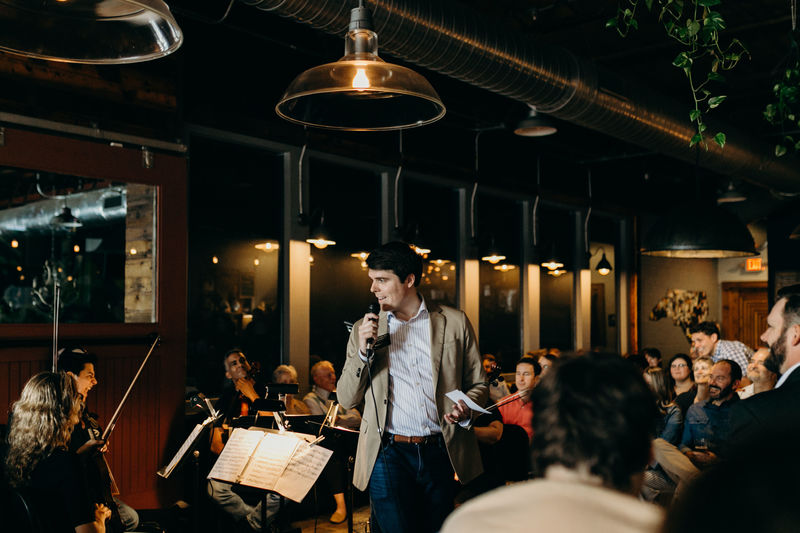 Courtesy photos
Courtesy photos
As a liberal-arts and research institution, Notre Dame may not (yet) have the musical street cred of a conservatory — but the graduates of our music department are still doing impressive things. Former music major Dan Crupi ’11 has made waves in the orchestra administration world since leaving Notre Dame, working for several years at North Carolina’s Greensboro Symphony Orchestra before being named executive director of the Santa Fe Symphony Orchestra and Chorus earlier this year. For our latest Questionnaire, I sat down with my fellow Folk Choir alum to talk about all things arts.
For those readers who might not know, what exactly does the executive director of a symphony do?
In short — a bit of everything! I am responsible for maintaining the general operations of the symphony. That includes ensuring that performances go off without a hitch, maintaining enough money in the coffers to keep the lights on, getting the company brand out in a positive way, and ultimately, making sure that everything the symphony does lives up to its mission of serving the community and providing outstanding musical and educational experiences for all to enjoy.
At a challenging time for arts funding, why are organizations like symphonies important — and how, in your role, do you convince community leaders of that importance?
You are right, it is a challenging time for arts funding in America. Public funding on the federal, state, and local level continues to decline. The current White House administration has attempted to eliminate the National Endowment for the Arts for two consecutive years. Arts curriculum is steadily being eliminated from public schools in the name of cutting expenses, resulting in fewer students discovering the wonder of music or dance or drama — and their lives are affected forever because of it.
Fortunately for the arts, they are an incredible unifier. They bring people together, help us share new perspectives, challenge our traditional ways of thinking, and elevate our daily life. Organizations like symphony orchestras now fill the curriculum gaps left by public funding cuts, providing weekly music lessons, full orchestral performances for thousands each year, and instruments for those that need them. I find that the best orchestras are those that have found relevancy in their communities beyond just performing classical music in a concert hall. They are out in the community changing lives, providing opportunity and making an impact.
How did your time at Notre Dame — a college environment that’s very different from what one might find at a traditional conservatory — prepare you for the career you have now?
I know that the reason I was able to successfully pivot from music performance into administration was due in large part to my experiences at Notre Dame. The liberal-arts approach allowed me to be more flexible, to question and think critically, and to develop effective communication and collaboration skills.

Plus, I believe there is an intangible to Notre Dame beyond its academic rigor. The soul of that campus is something truly special. It becomes a centering force in your life, which is undeniably important in the performance world. There are few career paths that demand so much and give so little — having that grounding spiritual force at your core is so crucial in that industry.
What advice would you have for someone with no experience attending live orchestra events who’d like to give the genre a try?
Attending a symphony orchestra concert does not have to mean a stuffy concert hall listening exclusively to Bach or Beethoven. So figure out what you like! Symphony orchestras are being forced to innovate, producing programs of Broadway, jazz, rock, country, and bluegrass. Video game concerts, or movies such as Harry Potter or Star Wars live in concert are becoming increasingly common and popular. You can even find orchestras performing in unexpected venues, from old warehouses and manufacturing plants to nightclubs and breweries. So find what speaks to you.
Second, don’t be intimidated. Live classical music is an organic art form just like any other; it is intended to elicit a response. Sometimes that response is wonder and awe; sometimes it is shock or discomfort. Do some research on the program before you go to enhance your experience, but most importantly, open yourself up to being moved and experiencing something transformational.
Symphony orchestras are such important and unique organisms. An orchestra is the most expressive instrument on the planet — it can represent so many genres, moods and eras effortlessly, and the excitement of watching 70 or 80 elite musical professionals playing as one unit is absolutely thrilling.
Finally, what do you think of ND’s fancy new music building? Will good ol’ Crowley Hall be missed?
I confess that I have not had the opportunity to visit the O'Neill Hall of Music yet — but what an incredible blessing for that department! I have many wonderful memories of Crowley, but it was not an ideal environment for musical study. I vividly recall trying to stage Mozart’s Le nozze di Figaro in the main opera rehearsal room my senior year and tripping over stairs or running into the large pillars that dotted the room and obstructed views. Ultimately, though, I know my classmates and I all think very fondly of our many, many hours spent in Crowley Hall — the memories you make with important people in your life are always more important than the structure itself.
Interview by Sarah Cahalan, a graduate student at the Medill School of Journalism at Northwestern University and a former associate editor of this magazine.